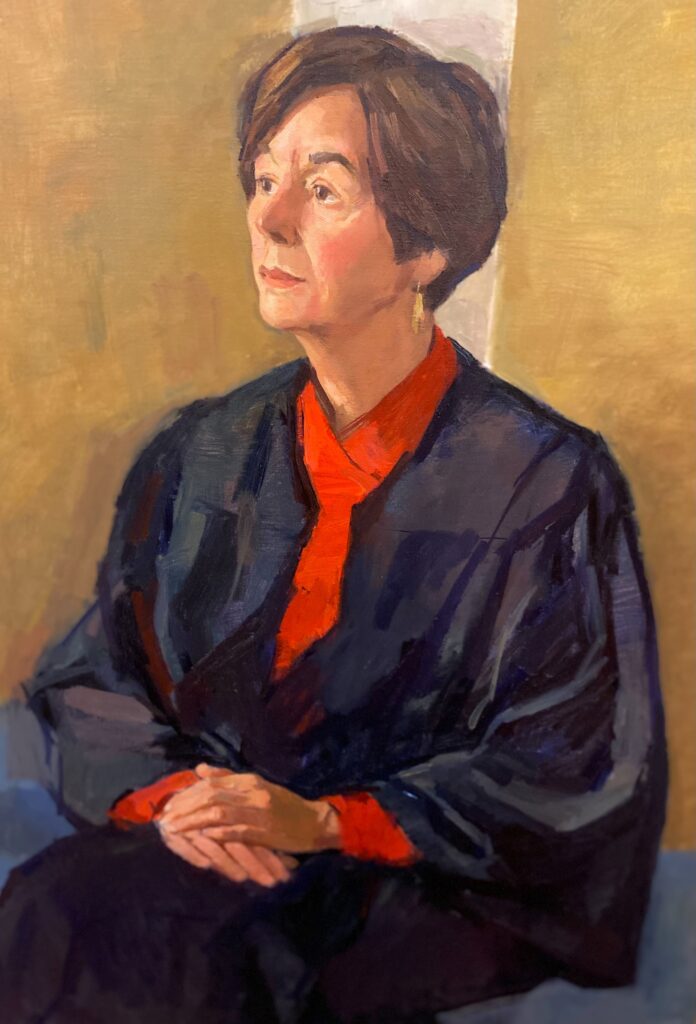

In 1979, Congress created four additional Article III judgeships on the United States District Court in Massachusetts. Along with a well-known Harvard Law professor and two exceedingly popular Massachusetts state court judges, President Jimmy Carter nominated Rya Zobel, then the first woman partner at Goodwin, Procter & Hoar, a large Boston law firm. When she was confirmed, Judge Zobel became the first woman appointed to the federal bench in all of New England. Her path to that distinct honor was anything but typical and further evidence of Judge Zobel’s intelligence, perseverance and courage, traits that have characterized her since her childhood.
Born in 1931 in what was soon to be Nazi Germany, Rya Weickert Zobel grew up in Zwickau, a small town in east Germany. Her mother was a concert violinist, and her father managed a literary arts publishing company. The family lived in Zwickau throughout World War II, and although there were many wartime shortages, her family managed to survive. Toward the end of the war, as it became evident that Germany was losing the war and the shortages of food and other essentials were compounded by frequent Allied bombing raids in Zwickau and, especially, in nearby Dresden, Rya and her family took shelter with friends in the countryside.
As the war ended, Zwickau was liberated by the Americans, some of whom lived in the Weickert home. The partition of Germany , however, resulted in Zwickau becoming part of East Germany under the control of the Soviet army. As they were leaving, the Americans offered to bring Rya’s family with them, but that offer was declined. Rya’s parents felt they were safe in Zwickau and did not feel it necessary to leave. By the summer of 1945, neither Rya nor her younger brother had been in school for more than a year.
One July afternoon in 1945, Russian soldiers arrived at Rya’s home and told her mother that they were looking for Rya’s father who was at work. The Russian soldiers left and returned a while later with Rya’s father. After a short time in the house, her father was arrested and taken away by the Russian soldiers.. Rya never saw or heard from her father again A few hours later, the Russian soldiers arrested Rya’s mother. She was imprisoned, initially relatively close to where they lived, but after some months she was sent to the Siberian Gulag where she remained for 10 years. The reason for their arrest was never clear, although it was suggested that the Russians thought the Weickerts were too friendly with the Americans.
Just 13 years old with a 10-year-old brother, Rya and her brother were taken in by family friends. Rya managed to find a bicycle and each day she would ride to the local prison where she was told her mother was being held. She would walk up and down on the street, hoping her mother would see her. She sent warm clothing and food into the prison for her mother, but it appears that none of these items ever reached her.
Upon learning of the family’s fate, her father’s sister, who lived in West Germany, sent a messenger to rescue the children. After several days travelling in trains, including a cattle car, Rya and her brother escaped from East Germany by crossing a barbed wire fence near Coburg. Eventually, they were reunited with their aunt and uncle. Once again, Rya’s courage and determination to save her brother and herself was evident as they waited for the next step in their journey.
When her mother’s brothers, who had emigrated to the United States many years earlier, learned where the children were, they immediately initiated the necessary paperwork to bring them to the United States. The two children came to New York on the SS Ernie Pyle, a former troop ship used to carry displaced persons after the war. The year was 1947 and Rya was just 15 years old. As the ship turned into New York Harbor, everyone who could ran to the deck to see the Statue of Liberty.
Seventy-five years later, Judge Zobel says, “I still get choked up thinking about it … that was just an amazing experience.” And, to this day, one of Judge Zobel’s favorite “duties,” and one in which she takes great pride, is the naturalization ceremonies for new United States citizens presided over by her as a U.S. District Court judge.
“I can relate to these people, and I have such admiration for the hardships which they endured to get to America and become citizens. I feel so lucky to be able to share my experience with them.”
Now in America as a young teenager, Rya wanted nothing more than to experience American life. Living on Long Island with her uncle and his family, she was enrolled in the local high school even though she spoke very little English. She had her first banana split and learned how to navigate the New York City subway system.
Two years later, she was a freshman at Radcliffe College, Harvard’s “sister” school. Admitted to Harvard Law School only three years after it had begun to admit women students, Rya was one of 13 women in a class of 500 men.
As she remembers it now, Judge Zobel says, “I was extremely lucky, I had an extended family who cared for me and my brother and were willing and able to support our coming to America and then paying for our education. I went to law school because I didn’t know what else to do. It turned out it really suited me. I liked law school. However, when I finished, there were few legal jobs for women. Even as a graduate of Harvard Law School, the only law firm job I could get was as a legal secretary.”
However, Chief Judge George Sweeney of the U.S. District Court for Massachusetts needed a law clerk and he hired Rya; she remained his law clerk until his death 10 years later. Her first job after her clerkship was as the first woman associate at Hill & Barlow, then one of Boston’s oldest and most prestigious firms. Several years later, she joined Goodwin, Procter & Hoar and ultimately became its first female partner. In 1979, she was nominated and confirmed to be a judge on the same U.S. District Court where she had been a law clerk for 10 years.
If the story ended there, it would still be remarkable. To grow up and survive in wartime Nazi Germany (with one parent who was Jewish) and then to escape East Germany with a young brother and travel alone to the United States and succeed as she did, both academically and professionally, is the stuff of which legends are made.
But, if anything, Judge Zobel’s judicial career is even more remarkable than her successful journey to that important position. Almost immediately, she established herself as a superb trial judge, equally prepared and comfortable in both criminal and civil cases. Trial lawyers wanted to appear before her because she was always on time, always prepared, and always even-tempered. According to her colleagues on the bench and attorneys who appeared before her, the judicial proceedings before Judge Zobel were fair and transparent.
In a recent interview, Judge Zobel explained why, in her nearly 43 years on the federal trial bench, she and her courtroom are so highly regarded: “I just don’t believe in judges screaming at lawyers or screaming at witnesses or defendants or lecturing them. I just don’t think that’s right.”
Whether handling complex intellectual property cases such as Polaroid Corporation v. Eastman Kodak Company, which involved allegations of patent infringement, to asbestos insurance coverage cases, which established the insurance standard for thousands of claims, or, most recently, a criminal case with 60 defendants, Judge Zobel has earned a reputation for managing and deciding complex cases. It is estimated that in her judicial career, Judge Zobel has issued about 2,000 decisions. Even in her current status as a senior judge, Judge Zobel estimates that she continues to manage about 150 cases, civil and criminal.
Nor has Judge Zobel’s judicial career been limited to the bench. In 1995, she became the first woman director of the Federal Judicial Center (FJC), chosen by its board of directors, chaired by then Supreme Court Chief Justice William Rehnquist. In that role, she instituted new systems and was responsible for training literally scores of new federal judges.
In 1999, when her term as FJC director ended, Judge Zobel returned to the District Court and her love of being a trial judge.
In 2020, all of her colleagues on the Massachusetts District Court signed a letter nominating her for the Devitt Award, the highest honor bestowed on a federal judge. Dennis Saylor, chief judge of the U.S. District Court for the District of Massachusetts, wrote: Judge Zobel “became the best trial judge in the District and one of the best in the Nation of the past four decades.” He said it became an adage among judges that when faced with a difficult decision, “Just do what Rya does; she is always right.”
“Every person,” he added, “leaves Rya’s courtroom inspired by her approach to the judicial process, improved by her human touch, and respectful of the decision rendered, whether or not it was favorable to them.”
A judicial committee chaired by Supreme Court Justice Neil Gorsuch selected Judge Zobel as the first woman U.S. District Court judge to receive the Devitt Award, a singular honor and yet another first for this legendary judge.
As noted in Chief Judge Saylor’s nomination letter: “Though her performance as a trial judge is legendary, many superb trial judges serve the public. Though she has made long-lasting contributions to the judicial system as whole, many Article III judges have also made important contributions. However, Rya Zobel the person is what sets her apart from the rest as both a judge and a human being. Rya brings a contagious zest to her work that infects all those around her with her delight in the judicial process, her openness to each new challenge, and her seriousness of purpose (but never excessive seriousness of self). Though she survived the Nazis and the Soviets, endured forced separation from her parents, made her way in a new and truly foreign world, and endured the difficulties that beset women entering the legal profession during the 1950s, Rya never utters a cross word. She does not dwell on the hardships of her past. She speaks glowingly of Harvard Law School, her reception in the Boston legal community, and the embrace she received from her male colleagues upon joining the bench. She is the epitome of warmth and civility.”
As an Article III federal judge, Judge Zobel has life tenure, but she knows that retirement will come when she is no longer able to do the work according to her own very high standards. Until then, she wants to continue judging: “It keeps my mind sharp.”
For those who appear before her or participate in her court proceedings, her sharp and fair mind and demeanor is both appreciated and respected.

Happy October, Gaveliers faithful. Are you loving this or what? No one believed a team made up of judges...


Hon. Diane J. Humetewa, the first Native American woman and the first enrolled tribal member to serve as a ...

Retired Massachusetts Chief Justice Margaret H. Marshall has been selected as the 2024 winner of the presti...

Dear Gaveliers Fans: I am delighted to announce the appointment of our first Gaveliers coaches, profiled...